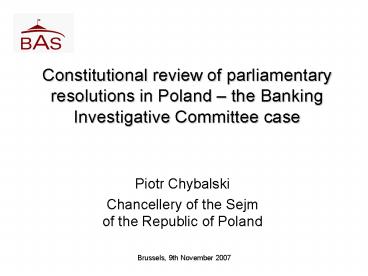Constitutional review of parliamentary resolutions in Poland
Title:
Constitutional review of parliamentary resolutions in Poland
Description:
Constitutional review of parliamentary resolutions in Poland the Banking Investigative Committee case Piotr Chybalski Chancellery of the Sejm –
Number of Views:76
Avg rating:3.0/5.0
Title: Constitutional review of parliamentary resolutions in Poland
1
Constitutional review of parliamentary
resolutions in Poland the Banking Investigative
Committee case
- Piotr Chybalski
- Chancellery of the Sejm of the Republic of Poland
2
Contents
- Evolution of constitutional review of
parliamentary resolutions - Analysis of the judgment of the Constitutional
Tribunal of 22nd Sept. 2006 on the so called
Banking Investigative Committee judgment (Ref.
No. U 4/06)
3
Evolution of constitutional review of
parliamentary resolutions (1)
- Before 1992/1993 parliamentary resolutions were
considered incapable of being reviewed by the
CT - Closed catalogue of sources of universally
binding law in Poland (did not include
resolutions), - the principle of parliamentary autonomy,
- old mentality (the Sejm still considered a
supreme State organ).
4
Evolution of constitutional review of
parliamentary resolutions (2)
- Constitutional Tribunals judgments of 1992 and
1993 (U 6/92, U 10/92, U 14/92) - Article 1 Para 2 of the CT Act of 1985 the CT
may control normative acts issued by supreme
and central State organs, - Admissibility of constitutional review of
parliamentary resolutions, if they are
normative, i.e. create abstract and general
legal norms, - Admissibility of constitutional review of
parliamentary rules of procedure.
5
The Banking Investigative Committee judgment (1)
- Article 95 Para. 2 of the Constitution of 1997
- The Sejm shall exercise control over the
activities of the Council of Ministers within the
scope specified by the provisions of the
Constitution and statutes. - Article 111 Para. 1 of the Constitution of 1997
- The Sejm may appoint an investigative committee
to examine a particular matter. - Act of 21st January 1999 on Sejm Investigative
Committees (Dz.U. No. 35, item 321, with
amendments)
6
The Banking Investigative Committee judgment (2)
- Resolution of the Sejm of 24th March 2006 on the
appointment of the Investigative Committee to
examine decisions concerning capital and
ownership transformations in the banking sector,
and the activities of banking supervision
authorities from 4th June 1989 to 19th March
2006, - Four Articles (creation of the committtee, scope
of activity, number of members of the committee,
entering of the resolution into force), - Group of Deputies to the Sejm applied to the
CTfor a review of Articles 1 and 2.
7
The Banking Investigative Committee judgment (3)
- Review of Article 1of the resolution
- Creation of the investigative committee,
- An act establishing a new organ shall be the act
of applying, as opposed to creating, the law.
Thus, acts appointing Sejm committees, including
extraordinary ones cannot be the subject of
review by the Constitutional Tribunal, - Discontinuation of proceedings by the CT.
8
The Banking Investigative Committee judgment (4)
- Review of Article 2 of the resolution(scope of
activity of the committee) - The article is an element of a legal norm
(together with Article 7 Para. 1 of the Act of
Sejm Investigative Committees), - The norm is general (defines the addressee by
indicating their generic features) and abstract
(regulates repeatable behaviours that may be
defined in a generic manner), - Conclusion Article 2 is normative, so its
constitutional review is admissible.
9
The Banking Investigative Committee judgment (5)
- Review of Article 2 of the resolution (scope of
activity of the committee) - The scope of activity was generally too broad
and too general, - An investigative committee may not control the
National Bank of Poland and the Committee for
Banking Supervision, - An investigative committee may not violate the
autonomy of private persons and entrepreneurs.
10
The Banking Investigative Committee judgment (6)
- Conclusions
- It is admissible for the CT to review
parliamentary resolutions even if only some of
their provisions are normative, - It is admissible for the CT to review provisions
of parliamentary resolutions even if they do not
constitute complete general and abstract legal
norms, but only elements of such norms.
11
Thank You for Your attention































